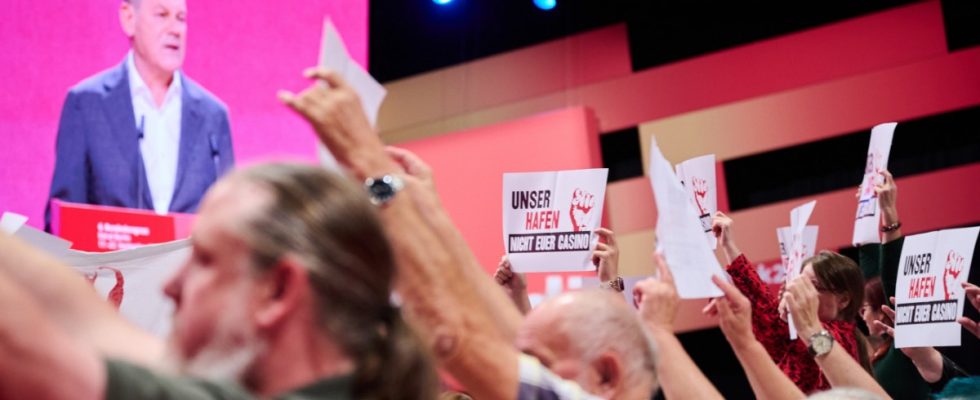At the start of its federal congress, the Verdi union is campaigning for better working conditions and more social justice. Chancellor Olaf Scholz (SPD) criticizes the minimum wage commission as a guest speaker – and is likely to heat up the debate in his party.
This year was marked by many heated collective bargaining rounds for the service union, in which members demanded large wage increases due to high inflation. Verdi implemented the largest salary increase in the public sector in many years. At the federal congress that takes place every four years, at which Verdi boss Frank Werneke stands for re-election, the eyes were now on Olaf Scholz on Sunday: What does the Chancellor say about working conditions in the Federal Republic?
The Verdi members at least heard that Scholz sees collective agreements as the stable foundation of the country: “We need more collective agreements. As a trade unionist, I regret that collective bargaining has declined.” The SPD Chancellor also emphasized the great importance of the welfare state for democracy. He criticized those who said that in these difficult times the welfare state must be scaled back. “The opposite is the case.”
The union members then had to listen carefully to the issue of the minimum wage. A society that wants to have a future must stick together, said Scholz. It was therefore right to raise the minimum wage to twelve euros in 2022 without consulting the responsible commission. Scholz explicitly complained that the employers in the commission had only implemented small increases of 41 cents each for the coming years. “I was just as unhappy as everyone here that the Minimum Wage Commission proposed such an increase,” said Scholz. “You have to evaluate it critically.”
So far he has accepted the Minimum Wage Commission’s proposal
However, the Chancellor is not yet deviating from his previous line of accepting the Commission’s vote – and not ignoring it again in order to increase the minimum wage more. Party leader Lars Klingbeil, on the other hand, opened the door for a larger increase, for example to 14 euros, by referring to the new EU directive on the subject. Now the SPD is likely to discuss this question again. Verdi is likely to reiterate the call for an increase in the minimum wage to at least 14 euros per hour from 2024 in a key motion at the congress.
The union stands for a policy of social justice and redistribution, explained its chairman Frank Werneke. In Germany, too, the gap between inheritances, high wealth and poor pay conditions is becoming ever wider: “That’s why our message is clear: taxes are high for the rich and for those who are winners of the crisis!” Germany needs a policy that overcomes inequality. “We need good educational opportunities from daycare to training and university. We need more investment and, above all, more staff.” The key is better working conditions for the around 1,000 jobs organized at Verdi.
Berlin’s Governing Mayor Kai Wegner once again questioned the debt brake at the congress in view of the high public investment needs. “I think we all agree that we have a huge need for investment in our country,” said the CDU politician. Massive investments must be made in transport infrastructure, in school and daycare buildings, in universities, in broadband expansion and in the area of climate protection. “The states will not be able to finance these investments from their state budgets,” added Wegner. “The debt brake must not be a brake on the future. That’s why we have to talk about it, across parties, in states and the federal government.”

